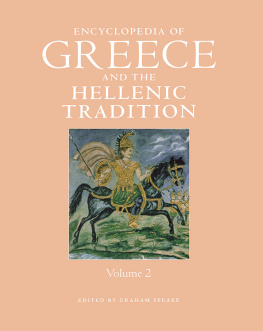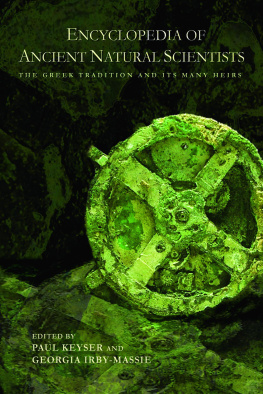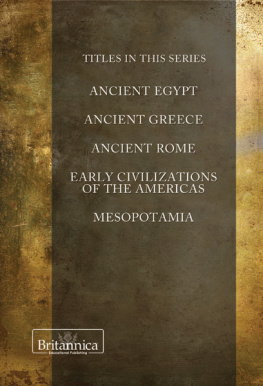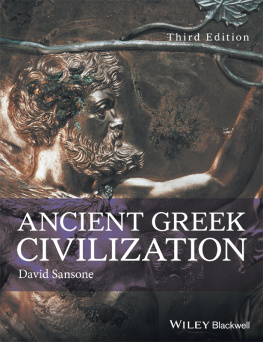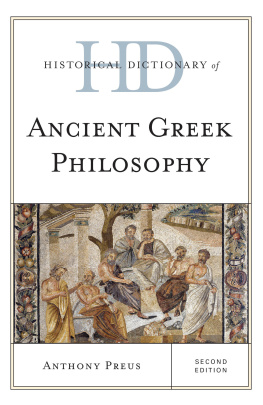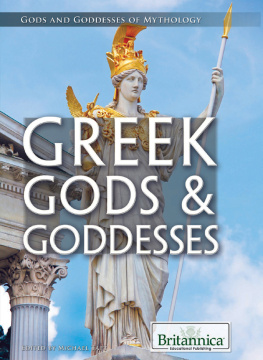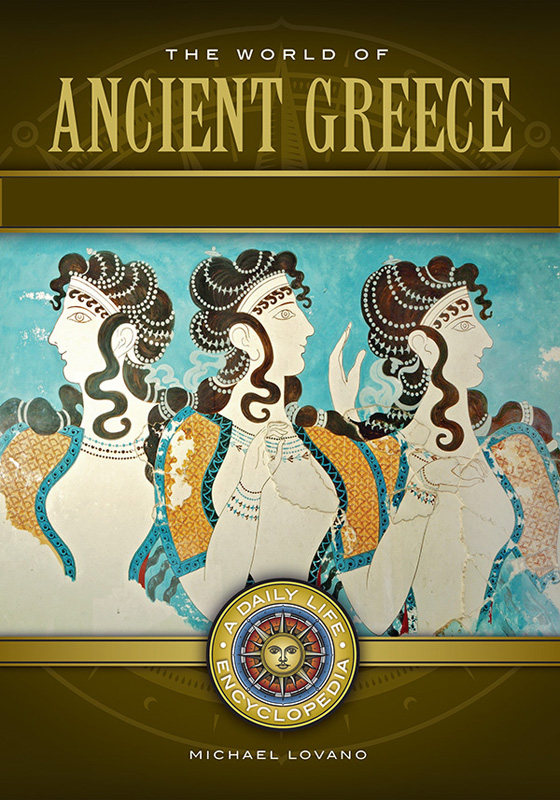The World of Ancient Greece
The World of Ancient Greece
To Vince and Joe
I could never have asked for brothers more true,
my own personal Castor and Pollux,
whose love and support have inspired me in so many of
the achievements in my life,
whose tenacious encouragement has helped this project come to fruition.
And to my nephew Simoni,
the most Greek of them all!
To Vince and Joe
I could never have asked for brothers more true,
my own personal Castor and Pollux,
whose love and support have inspired me in so many of
the achievements in my life,
whose tenacious encouragement has helped this project come to fruition.
And to my nephew Simoni,
the most Greek of them all!
Copyright 2020 by ABC-CLIO, LLC
All rights reserved. No part of this publication may be reproduced, stored in a retrieval system, or transmitted, in any form or by any means, electronic, mechanical, photocopying, recording, or otherwise, except for the inclusion of brief quotations in a review, without prior permission in writing from the publisher.
Library of Congress Cataloging-in-Publication Data
Names: Lovano, Michael, author.
Title: The world of ancient Greece : a daily life encyclopedia / Michael Lovano.
Description: First edition. | Santa Barbara, California : Greenwood, an imprint of ABC-CLIO, LLC [2020] | Series: Daily life encyclopedias | Includes bibliographical references and index.
Identifiers: LCCN 2019014386 (print) | LCCN 2019015427 (ebook) | ISBN 9781440837319 (ebook) | ISBN 9781440837302 (set : alk. paper) | ISBN 9781440849404 (volume 1) | ISBN 9781440849411 (volume 2)
Subjects: LCSH: GreeceCivilizationTo 146 B.C.Encyclopedias. | GreeceSocial life and customsEncyclopedias.
Classification: LCC DF16 (ebook) | LCC DF16 .L68 2020 (print) | DDC 938.003dc23
LC record available at https://lccn.loc.gov/2019014386
ISBN: 978-1-4408-3730-2 (set)
978-1-4408-4940-4 (vol. 1)
978-1-4408-4941-1 (vol. 2)
978-1-4408-3731-9 (ebook)
242322212012345
This book is also available as an eBook.
Greenwood
An Imprint of ABC-CLIO, LLC
ABC-CLIO, LLC
147 Castilian Drive
Santa Barbara, California 93117
www.abc-clio.com
This book is printed on acid-free paper 
Manufactured in the United States of America
Copyright 2020 by ABC-CLIO, LLC
All rights reserved. No part of this publication may be reproduced, stored in a retrieval system, or transmitted, in any form or by any means, electronic, mechanical, photocopying, recording, or otherwise, except for the inclusion of brief quotations in a review, without prior permission in writing from the publisher.
Library of Congress Cataloging-in-Publication Data
Names: Lovano, Michael, author.
Title: The world of ancient Greece : a daily life encyclopedia / Michael Lovano.
Description: First edition. | Santa Barbara, California : Greenwood, an imprint of ABC-CLIO, LLC [2020] | Series: Daily life encyclopedias | Includes bibliographical references and index.
Identifiers: LCCN 2019014386 (print) | LCCN 2019015427 (ebook) | ISBN 9781440837319 (ebook) | ISBN 9781440837302 (set : alk. paper) | ISBN 9781440849404 (volume 1) | ISBN 9781440849411 (volume 2)
Subjects: LCSH: GreeceCivilizationTo 146 B.C.Encyclopedias. | GreeceSocial life and customsEncyclopedias.
Classification: LCC DF16 (ebook) | LCC DF16 .L68 2020 (print) | DDC 938.003dc23
LC record available at https://lccn.loc.gov/2019014386
ISBN: 978-1-4408-3730-2 (set)
978-1-4408-4940-4 (vol. 1)
978-1-4408-4941-1 (vol. 2)
978-1-4408-3731-9 (ebook)
242322212012345
This book is also available as an eBook.
Greenwood
An Imprint of ABC-CLIO, LLC
ABC-CLIO, LLC
147 Castilian Drive
Santa Barbara, California 93117
www.abc-clio.com
This book is printed on acid-free paper 
Manufactured in the United States of America
Contents
VOLUME 1
VOLUME 2
Contents
VOLUME 1
VOLUME 2
The ancient Roman poet Horace, who lived in the first century BCE, once wrote that Greece, though conquered militarily by Rome, had, in fact, captured Rome. He meant by this that the Romans became cultured and civilized thanks to the Greeks, whose literature, philosophy, science, art, and so much else, had cast such a spell over the rude Romans.
It could certainly be argued that no other culture in human history has had as much worldwide impact as the ancient Greek culture has. The modern world finds its primary birthplace in ancient Greece. We have inherited their categorization of government, whether aristocracy, democracy, or tyranny. Their innovative thinkers inspired the firm commitment to rationalism and science that has come to characterize modernity since the Scientific Revolution. The ancient Greeks have passed on to us their love of athletics; their sense that struggle and competition should be embraced in all aspects of life; and their respect for the performing and plastic arts and for the storytelling of poetry, history, and theaterall of which teach us about ourselves, who we are, and where we have come from. Philosophy, rhetoric, tragedy, economy: these are ancient Greek words, and they embody ancient Greek ideas about the nature of the world.
The civilization of the ancient Greeks emerged in the second millennium BCE as seminomadic tribes, speakers of the Greek language in several forms, filtered into the Aegean region. They were not the first inhabitants of that part of the globe; hunters and gatherers had been there before them (as far back as 55,000 BCE) as well as farmers and herdsmen (as far back as 7000 BCE). Still, the Greeks of the Bronze Age, especially those whom scholars call the Mycenaean Greeks (c. 1700c. 1100 BCE), introduced a socioeconomically, politically, and militarily sophisticated culture to that region unlike anything it had previously experienced. These Bronze Age Greeks had much in common with their neighbors to the east and south, the advanced societies of the Ancient Near East, especially the Hittites and the Egyptians; from these societies, the earliest-recorded Greeks learned much. Evidence from archaeology (ruins of fortresses and tombs and artifacts from personal life, trade, and warfare as well as the earliest records written in a form of the Greek language) provides us with much of our knowledge for this period in Greek history.
Then came a socioeconomic collapse that still baffles explanation (or, at least, easy explanation), and the Greek world consequently entered a Dark Age (c. 1100c. 800 BCE), in which much of our archaeological record vanishes. The Greek culture that emerged afterward, the one with which most moderns are familiarwith its temples, statues, Olympian gods, games, alphabet, heroes, and so oncertainly began to develop within that murky period of time, for it appears fully formed (like Athena from the head of Zeus) at the dawn of what scholars call the Archaic Period (c. 800490 BCE). From the end of the Dark Age, the historical record becomes rich in archaeological evidence, with a wealth of artifacts (currency, inscriptions, papyri) recording the thoughts, hopes, and aspirations of the Greeks themselves. To the Archaic Period also date the original works of Greek literature, history, philosophy, and science that were so thoughtfully preserved and duplicated in manuscript form by later generations of Greeks down through the days of the Byzantine Empire.

![Michael Lovano The World of Ancient Greece: A Daily Life Encyclopedia [2 Volumes]](/uploads/posts/book/268736/thumbs/michael-lovano-the-world-of-ancient-greece-a.jpg)

